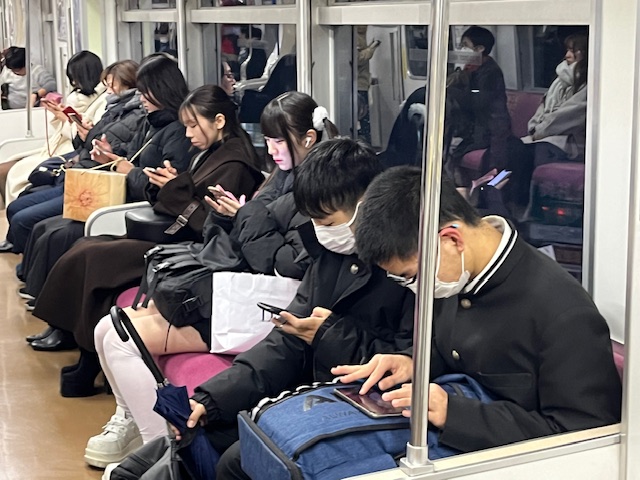
letters-home-japanese-addiction-to-smartphones
Of course, it goes without saying that Japanese youth are no more addicted to their cellphones than any other young person in an industrialized country, but it does seem to be bordering on becoming a full-fledged epidemic in Japan.
The widespread use has gotten the attention of the government and schools which have them troubleshooting how to get ahead of the current trend before it becomes out of control completely.
The ease and convenience of smartphones have made them indispensable in our daily lives and their use has become so prevalent across all age groups and socio-economic levels that it seems to be an automatic response for people to pull out their smartphones to kill time when waiting in line at the post office, riding on a train (photo), or even when having dinner with family and friends.
Young and old alike have become entirely too dependent on their devices to the point that it is causing behavioral changes across all of society. Couples out on a date can be observed with their noses in their phones, texting furiously, when a live, actual person is sitting across the table from them. There is a fear that people will lose the ability to interact appropriately with other people in social or business situations.
No doubt, the entire COVID-19 pandemic didn’t help the situation that began before the health-scourge occurred that made people isolate for long periods of time in often government-mandated quarantine scenarios. People got accustomed to not coming face-to-face with other people and this became the new normal. It has been difficult for people to get back to pre-pandemic levels of human interaction.
My colleagues and I were discussing how the class of kids that entered university after things normalized somewhat in Japan after the pandemic were the ones who spent two to three years in quarantine doing their lessons remotely. Part of going to school is the socialization aspect of interacting and negotiating with other kids and teachers throughout the day.
These kids missed out on a hefty chunk of time to experience that aspect of their teenage life, and in many instances, it shows. Some of these kids seem more withdrawn and less motivated to try to interact in meaningful ways in the classroom or in club activities. I had a number of students who were being treated for mental health issues that resulted directly from being isolated so long during the pandemic.
Thankfully, it is slowly getting back to normal, but that initial period of time when the kids came out of isolation and were thrown directly back into social situations caused some to have difficulty interacting in a classroom situation, not being comfortable presenting orally or answering verbally in class, etc.
In Japan, like many other countries, issues related to pathological Internet use, such as self-imposed isolation, pornography addictions, a general Internet addiction and Internet use disorder, behavioral issues and a related issue I see in my students is an Internet gaming addiction or disorder that seems almost obsessive.
I read a research study (Tateno, et al) that stated that Internet use has been increasing year after year and today there are over 100 million Internet users in Japan. Each day, the actual time that people are using the Internet via their smartphones is increasing more and more. This widespread and increased use of a smartphone is leading to not only mental health issues, but also dietary issues regarding proper nutrition because Internet addicts tend to eat processed and quick, instant meals; often Internet addicts become sleep deprived (especially “gamers” who cannot stop playing, trying to reach that next high of achieving the next game level); which is related to academic failure in some cases because their obsession leaves little time for their studies. Smartphones allow for convenient and instant access anytime and anywhere, usually.
The research study I read indicated that smartphone addiction “is characterized by excessive and problematic smartphone use and clinical features of behavioral addiction [are affected by]: preoccupation, functional impairment, withdrawal and tolerance.” (Tateno, et al, 2019) The study surveyed 573 Japanese university students as respondents.
I guess I am sounding like a “boomer” complaining about the spread of these new-fangled devices that are ruining society as we know it. It is important to note that the invention of the radio and then TV, and the widespread use of those “new technologies” amongst the citizenry, predicted similar dire and gloomy effects on society and humanity at large, so will smartphone Internet use eventually balance out and people will just absorb it and adapt it into their own psyche? Will the hype surrounding the pervasive use of smart devices just be accepted and become normalized? Has it already?
Only time will tell, of course, but enough research is being done currently to raise alarm bells amongst government agencies in charge of such things.
Online bullying is a real issue in Japan, too, like elsewhere. Students (and professionals) can hide behind anonymity to lash out and harangue others online or on social media sites. It can especially be detrimental to younger people who place so much value and emphasis on their social standing in a group, and to be ostracized or ganged up on in such a group can have severe mental and emotional repercussions on a young brain that is still developing and one which has a difficult time separating short-term/long-term issues from what is essentially important and what really doesn’t matter.
During official meetings I notice my colleagues checking their phones incessantly. The tell-tale vibration means someone has reached out to them, or commented on something they are following. This becomes very distracting not only to the person who should be paying attention to the agenda at the meeting, but to those around him/her who hear the same vibrating noise and briefly focus their attention on that which is happening in real time instead of what is being discussed at the meeting.
I sometimes forget my smartphone when I leave the house, which is nearly impossible for some people to fathom because having one’s cellphone with them is almost as important as it once was for a person with false teeth to put their teeth in before leaving the house. I came to the whole smartphone craze late, opting to use a flip phone for as long as possible.
Now that I have a smartphone, though, I can’t imagine living without it. I try to stay cognizant of people I am with not to be distracted by the phone when I am with other people, but the potential for addiction is real. However, the convenience and ease of having the world at your fingertips is also a valid reason for getting with the program and entering the 21st century feet first.
The idea for this column came from my experience of riding trains here in Japan and noticing that 98% of passengers sit down (or stand) while flipping through their phones or watching YouTube or TikTok using headphones. In Japan, it isn’t polite to chat on trains with other people, so smartphones allow people to occupy themselves for the duration of their journey which doesn’t bother those around them. It is an automatic response, I have noticed, for people to sit down and pull out their phone.
I guess it is a bit hypocritical of me to be writing about the evils of having instant access to everything via a smartphone considering most of you who are reading this article at this moment are likely using your smartphone to do so! And there lies the crux of the argument, I suppose.
Does one sacrifice the ease and convenience of having access to everything and everyone via an electronic device or take the risk of it becoming an obsessive-compulsive disorder? Balance and self-discipline are the keys to navigating the 21st century in a healthy and time-efficient manner.
Note: Reference cited: Tateno, et al (2019) “Smartphone addiction in Japanese College Students: Usefulness of the Japanese Version of the Smartphone Addiction Scale as a Screening Tool for a New Form of Internet Addiction” published by PubMed Central.





